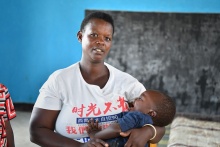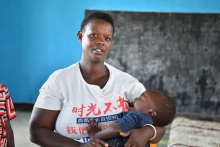In Rwanda, women spend an average of seven hours per day on unpaid care work, compared to men’s average of 2.1 hours. This imbalance severely limits women’s ability to achieve economic opportunities on par with men.
One approach to address that challenge is found in UN Women’s partnership with the district of Nyaruguru to establish three Early Childhood Development Centres (ECDs). The centres provide children with a safe environment, offering daily nutritional meals and educational activities at an affordable cost. Over the last three years, more than 200 women have sent their children to the facilities during the day while they pursue an income.
“Having joined the ECD in Munini in April 2022, there has been a big difference in my life, and that of my family”, Mukamana said. “Here my children are safe, they can play and learn, get a balanced diet, but also have stimulating activities to lead their development.”
“Since I am now able to fully focus on my work, I have become a lot more productive and now even make more money to support my family”, she continued. “Our living conditions have also changed for the better, and there is a lot more harmony in our home.”
The ECDs are made possible with funding from Unilever and the Government of Korea, which have invested approximately USD 460,000 into UN Women’s “Safe Public Spaces” project in Rwanda. That project has also reached 8,279 women and 6,918 men in an effort to transform negative social norms and create safe environments for women to pursue income generating activities.
UN Women has partnered with the Rwanda Men’s Resource Centre (RWAMREC) and Action Aid to address negative social and cultural beliefs about women’s roles and responsibilities.
“We cannot understate the importance of having men and boys as partners towards gender equality”, said Jennet Kem, the UN Women Representative in Rwanda.
Speaking at an awareness raising event in Nyaruguru district, she said that testimonies presented there proved, “when all are involved as partners towards our common goal for equality, households and communities become more prosperous, unified, and peaceful.”
Nyiramayira Donatile, a participant who attended trainings on gender equality and conflict prevention with her husband, said that she used to wake up and “immediately start sweeping the house, cut grass for cows, harvest sweet potatoes, gather firewood, then cook for my family. Sometimes the sun could set with many tasks still left pending.”
“It was quite overwhelming because my husband did not help with any of the household chores and would even squander our finances when he sold off our livestock without consulting me”, she added.
But after the training, Donatile said, she and her husband were able to better balance their household tasks to ensure that the burden did not become overwhelming.
“We are now a team”, she said. “My husband also supports with various chores around the house, making it easier for me to complete my tasks, but also participate more effectively in my small vegetable business that helps to increase our family`s income.”
In another programme, UN Women has partnered with ADEPE Rwanda, the Young Women’s Christian Association, and other organizations to supply women with skills training in business management, entrepreneurship, and financial literacy, as well as start-up capital.
That programme, with USD 2 million in funding from the Swiss Agency for Development and Cooperation, has reached more than 2,500 women, including those living with disabilities, former sex workers, and adolescent mothers. About 80 per cent of the participants went on to start or expand their own businesses.
Dative Mfitumukiza, a young woman living with a physical disability in Musanze district, shared how her participation in the programme helped her find more fulfillment in life.
“Growing up with a physical disability made life very challenging. Despite this, I was determined to complete my high school education, and hopefully get right into doing business”, she said. “After graduating, making money to support myself proved very difficult. Things became even tougher when I had my two children.”
“When I was approached by ADEPE to take part in the UN Women trainings, I felt a great sense of hope”, Mfitumukiza said. “With the knowledge and support I received, I now run a small business of selling cassava flour and can make up to 100,000 Rwandan Francs a day [about USD 80].”
“With this, I am able to educate my children, pay for health insurance, rent a piece of land for business, and also give a monthly contribution to our savings group”, she added.
The stories shared by Mukamana, Donatile, and Mfitumukiza are evidence of the transformative impact of investing in women’s economic potential, safety, and inclusion.
“Our joint interventions are proof that we have to collectively revisit and address the predated structures, stereotypes, and cultural beliefs that exclude and discriminate against women and girls, ultimately limiting their potential”, said Jennet Kem.
“The power to change is in our hands, and we need all hands on deck, including men, boys, authorities, community leaders, and more”, she added. “That is how we can do things differently and influence lasting change.”

